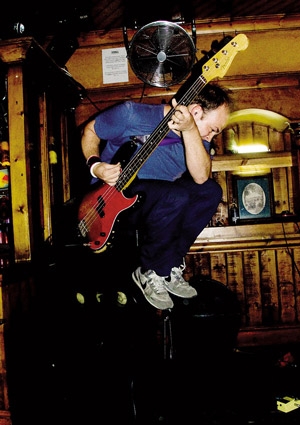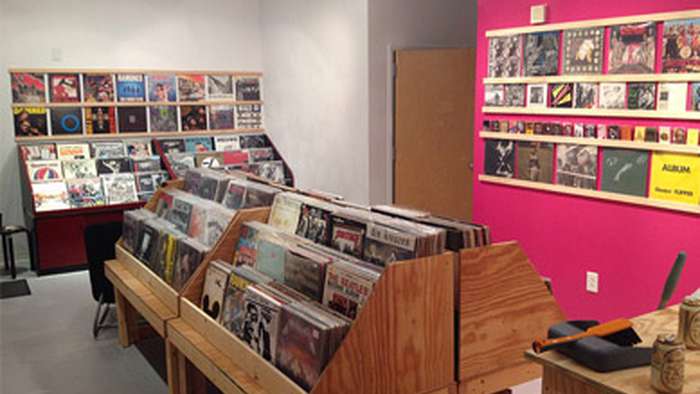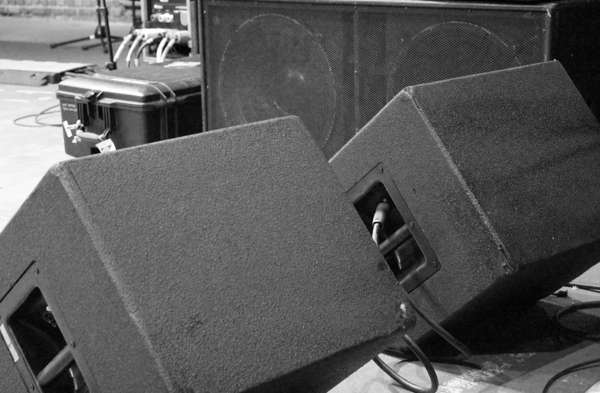Since 2005 Sorry State Records has grown from a small boutique label into one of the most dependable, well-curated record distributors in the global punk & hardcore network. While the label maintains a heavy contingency of bands from their home state of North Carolina, they've also released records from a number of bands from around the world. 2013 was a banner year for the label, as not only did they open up a storefront in their hometown of Raleigh, but they released highly acclaimed records from the likes of Nö Pöwer, Joint D≠, Broken Prayer, Rough Kids and others. Sorry State owner and operator Daniel Lupton took some time to talk with SPB about running the label.

Scene Point Blank: What was the catalyst that got you into punk and hardcore? Is there moment in time that you can pinpoint?
Sorry State Records: I think I took a similar path to a lot of people my age (I’m 34). I was super into skateboarding as a kid, and was around 12 when Nirvana really blew up. Being a curious kid I just followed the breadcrumb trail that led me to heavier and more intense stuff. So from Nirvana you get into Sonic Youth and Mudhoney, and eventually you make your way down to Black Flag and Minor Threat, which is the stuff that really blew my mind. I knew I was hooked when I first heard Minor Threat. If there’s a moment I can pinpoint it’s definitely that. It was just the rawest, most intense, and best music I’d ever heard in my life. I’ve often said that every subsequent record I’ve ever bought in my life is just chasing after the bliss of that one moment when Minor Threat completely blew my mind.
Scene Point Blank: Before you started Sorry State were you involved in the punk scene in other ways – zines, bands, etc.?
Sorry State: Sort of. I used to do an online zine called Deep Fry Bonanza that had a small but dedicated following, and then that kind of mutated into a blog called Dead Metaphor after I got tired of writing about crappy promos all of the time and wanted to focus more on the music I was actually excited about. I put a lot of work into those sites. I think I probably wrote close to 2,000 record reviews for Deep Fry Bonanza, many of which were well over 1,000 words. However, because those things were online I still never really felt like part of the scene…I was still a spectator. I think part of that was also coming up in the Richmond, VA area. The scene there is kind of insular and I’m super shy by nature, so I just never found my way in.
Scene Point Blank: So from there you decided to start your own record label?
Sorry State: Starting a label is something I had always wanted to do, and I actually had the money set aside for it for quite a while before I actually used it. I tried to arrange a licensing deal for some out of print Leatherface stuff but that never really came together, so I just put the money aside waiting to find a new band I was really excited about.
Direct Control was definitely that band. They were just on fire in their early years, so I proposed that they let me put out a record and they were stoked on the idea. Everything just kind of snowballed from there. I never planned on it being what it is today. I just wanted to put out a 7” to say I’d done it, but it was super successful and I felt like I was good at it, so I just kept going.
Scene Point Blank: The Sorry State Newsletter emails always reminds me of reading zines – very well-written, and done with a passion for the music that totally bleeds through. Do you write that yourself?
Sorry State: Yeah, I write those all myself, and I know lots of people look forward to reading it like a zine every month. Writing about music is definitely one of my great passions in life. If you sit me down in front of a computer screen there’s a pretty good chance that within minutes I’ll be somewhere on the internet writing about music.
Scene Point Blank: So aside from the newsletter, are there other outlets you currently write for?
Sorry State: I have done a lot of writing in my life, both about music and other stuff, but the newsletter and web site are definitely my main outlets nowadays. Like I said, I used to do a zine but I really got burnt out on “critiquing” other people’s work. I feel like life is too short to spend my time tearing apart someone’s hard work. I’d rather spend my time and energy trying to get attention for the stuff that I’m excited about. I do occasionally write for other publications when I’m asked, but I’ve never really sought anything like that out. It would definitely have to be the right project for me to get excited about it, though, because I really think that most music writing nowadays is pretty much crap.
Scene Point Blank: You also run a record store. How many people are involved with the day to day operations of Sorry State?
Sorry State: Well, at the end of the day Sorry State is just me. It’s a reflection of my tastes and values, and I plan to keep it that way. That said there are a lot of people who help out enormously. My two employees at the store, Seth and Jeff, both do a lot of the grunt work involved in running the label and also serve as really good sounding boards about bigger decisions like whether to do certain projects, critiquing layouts, etc.
Scene Point Blank: Do you also maintain a day job? Are you a family man?
Sorry State: I do currently have a day job. I’m an adjunct English professor at the University of North Carolina - Chapel Hill. I’m not sure how long I’ll be doing that, though. I love teaching, but there is no job security and I could probably make a good enough living from the store and the label if I buckled down and got a little better at planning and a little more budget-conscious. I don’t have any kids, but I do have a girlfriend and a cat. They certainly don’t slow me down, though. In fact they keep me going!
Scene Point Blank: Sorry State seems to release a wide range of bands from within the punk and hardcore spectrum. Does the label have a conscious goal or a theme with all of its records?
 Sorry State: Nothing really beyond putting out stuff that I think is good. Sometimes I get on certain kicks or get ideas about what kind of direction punk should be moving in. Right now I’m really not feeling a lot of the retro stuff that I was super into around when the label started. I think there are a lot of exciting bands out there like Broken Prayer and Whatever Brains that sound like nothing before in the history of music, and I want to be involved with stuff like that that sounds like NOW rather than some particular time in the past. Really, at the end of the day, though, Sorry State is just what I think is good and worthwhile.
Sorry State: Nothing really beyond putting out stuff that I think is good. Sometimes I get on certain kicks or get ideas about what kind of direction punk should be moving in. Right now I’m really not feeling a lot of the retro stuff that I was super into around when the label started. I think there are a lot of exciting bands out there like Broken Prayer and Whatever Brains that sound like nothing before in the history of music, and I want to be involved with stuff like that that sounds like NOW rather than some particular time in the past. Really, at the end of the day, though, Sorry State is just what I think is good and worthwhile.
Scene Point Blank: How do you decide which acts you’re going to do a record for? Are you solicited, or are you seeking them out?
Sorry State: That’s a big decision and, as more of my financial well-being (and others’!) is tied to the success of the label and the store, the decision weighs on me more heavily. It used to be that if I had some money and I heard something good I’d put out a record. So a lot of releases were more a function of good timing than anything else: the band had a record done and I liked it and had the means to put it out…and I did it. Nowadays I like for each release to feel like it’s moving me forward in some way, and I tend to prefer bands that are more active than not. Most bands that approach me seriously are already friends and totally understand that and it isn’t a problem. I get demos in my inbox almost every day, though, and almost all of them I turn down.
Scene Point Blank: A lot of Sorry State releases are from bands in your area. How much does the regional scene play a part in what you choose to release?
Sorry State: It’s definitely easier for me to release local stuff. I like to know the people involved with the records I put out, if for no other reason than to ensure that I’m on the same page as them ethically, politically, and aesthetically. It also makes things easier in terms of communication. And of course especially now that I’ve opened the store I have a vested interest in making the local scene as big and as awesome as possible. For those reasons I think you’ll probably see more and more North Carolina bands on Sorry State.
Scene Point Blank: What are some bands and/or artists that you’d like to work with that you haven’t yet gotten to?
Sorry State: That’s a really tough question, especially since some of my absolute favorite current and recent bands are already on the label. There are plenty of records that I wish were more widely available and deserve a really nice reissue, but these days I would rather spend my money and effort on putting out a great new band (and there are plenty) rather than doing a reissue. I guess mostly I just want to hear more new records by Broken Prayer, Whatever Brains, the #1s, Brain F≠, etc.
Scene Point Blank: I imagine in the age of illegal downloading, running a record label is challenging.
Sorry State: Well, we certainly sell far fewer records we did than when the label started, which was already well into the download era. Our first release sold thousands, while we mostly start with 300-500 copy pressings of newer releases and rarely repress anything. I don’t really like to complain, but the environment is really tough and you have to be on your toes and constantly adapt to changes so that you don’t get stuck with a lot of records that you can’t sell.
Scene Point Blank: What makes you continue to do it?
Sorry State Records: I guess I keep doing it because I think it’s worthwhile and I think that I’m the right person for certain jobs. I have lots of friends and acquaintances who make incredible music, and I think I’m pretty good at helping people to realize their vision as a fully-formed, finished product. There are still very few days that are as satisfying as new release day, when you see all of these ideas you’ve been working with for months finally manifested as a real-life object. That process of translation still fascinates me, so I keep doing it.
Scene Point Blank: Is everything Sorry State puts out available on vinyl? How about cassette? Are you committed to any one format?
Sorry State: I guess I’m not really committed to any format except vinyl. I like cassettes myself, and I think they’re especially great for short-run, specialist, and demo releases. Cassettes also lend themselves more to the hand-made style of packaging I’ve been more into lately. There’s no rule that anything has to be on a certain format. Really I think every project is different and I want it to be available on the format(s) that work best for the band’s vision. Usually that’s vinyl, but sometimes it’s something else.
Scene Point Blank: Most of your releases are also available digitally on a name-your-price scale. What’s your reasoning behind the name-your-price?
Sorry State: I’m not really sure why I do the name-your-price thing on Bandcamp. I guess it started as an experiment to see if people would actually pay anything, and by and large they do. I imagine I would probably make more money if I made people pay some amount—even a small one—but I also like people being able to hear stuff whenever they want. I never really understood trying to hide music from people. If a label doesn’t have a release up for streaming it’s almost like they don’t think you’ll buy it if you hear it first. I’d like to think that I put out stuff that’s good enough that listening to it makes you want to buy it.
"I like people being able to hear stuff whenever they want. I never really understood trying to hide music from people."
Scene Point Blank: Your newsletter always features a distro of other label’s releases and it’s not uncommon to see Sorry State releases in other distros. Talk about how those relationships are formed and how conducive they are to global punk/HC network.
Sorry State: Those relationships are really the backbone of the punk scene, and I work with as many other labels and distros as I can. Everyone is always short on cash, so having such a large part of the label’s business accomplished through bartering really helps a lot, and I’m always happy to pay up front for releases when people really need the cash (and I need the release of course!).
Scene Point Blank: How do you decide what to carry in your distro?
Sorry State: I guess I mostly just carry music that I like or am interested in. I always work especially hard to get in stuff that people are currently stoked on, and there are certain labels like Toxic State, Grave Mistake, Feral Ward, from whom I’ll carry every release in large quantities because their labels are such a consistent mark of quality.
Scene Point Blank: One thing that always stands out about Sorry State releases is the album artwork. It’s often different from the reusable imagery normally associated with punk/HC. Is there a conscious effort to avoid the ubiquitous bullet belts, Crass font, spiky skulls, and such?
Sorry State: Actually, these days most of the imagery comes from the bands themselves. I rarely lay down the law and say “No, we’re not having a skateboarding skeleton on the cover of this record!” I think what tends to be the case is that musically adventurous bands are more visually adventurous, and bands that meticulously craft their music also want to meticulously craft their artwork. This is exactly why I prefer to work with people I know… because I kind of know their tastes and know that stuff like this won’t be an issue down the road. But yeah, at the end of the day it’s a conscious effort to eschew the normal both visually and musically.
Scene Point Blank: Do you view your releases in terms of years or quarters, or is it more accurately based on recording and pressing schedules?
Sorry State: Nope. We’re working with punk bands here, so when a band hits me up and says “Hey, we’re recording this spring for a record that we want out this summer or fall,” I know that almost without fail they will run several months and even sometimes years behind schedule. There have been a few times during the life of the label where everything came due at once and it was really stressful, so I try to make sure that there isn’t more in the works than I can actually handle. I’ve also been taking things easy in order to concentrate on opening and running the store, so I’ve had a lighter release schedule than normal.
Scene Point Blank: So what does Sorry State have on the horizon for 2014? Is there any specific record you're excited to release in the next year?
 Sorry State: Well, I just put out the new Brain F≠ LP along with Alex at Grave Mistake and I really couldn’t be more excited about that. It’s one of the best records I’ve ever been involved with. A bunch of new bands are currently working on new material for the label: Whatever Brains, Skemata, Dark Ages, Broken Prayer, and Rough Kids all have space reserved on my timeline. Beyond that, I really want to focus on a lot of the new batch of bands that are coming out of North Carolina, so my next project will probably frame things in that way… it’s still coming together, but hopefully I’ll be ready to talk more about that this summer.
Sorry State: Well, I just put out the new Brain F≠ LP along with Alex at Grave Mistake and I really couldn’t be more excited about that. It’s one of the best records I’ve ever been involved with. A bunch of new bands are currently working on new material for the label: Whatever Brains, Skemata, Dark Ages, Broken Prayer, and Rough Kids all have space reserved on my timeline. Beyond that, I really want to focus on a lot of the new batch of bands that are coming out of North Carolina, so my next project will probably frame things in that way… it’s still coming together, but hopefully I’ll be ready to talk more about that this summer.
Scene Point Blank: Thanks for taking the time to talk with us. We really appreciate it.
Sorry State: Thank you for the interview! And thanks to everyone who supports the label, store, and distro!











